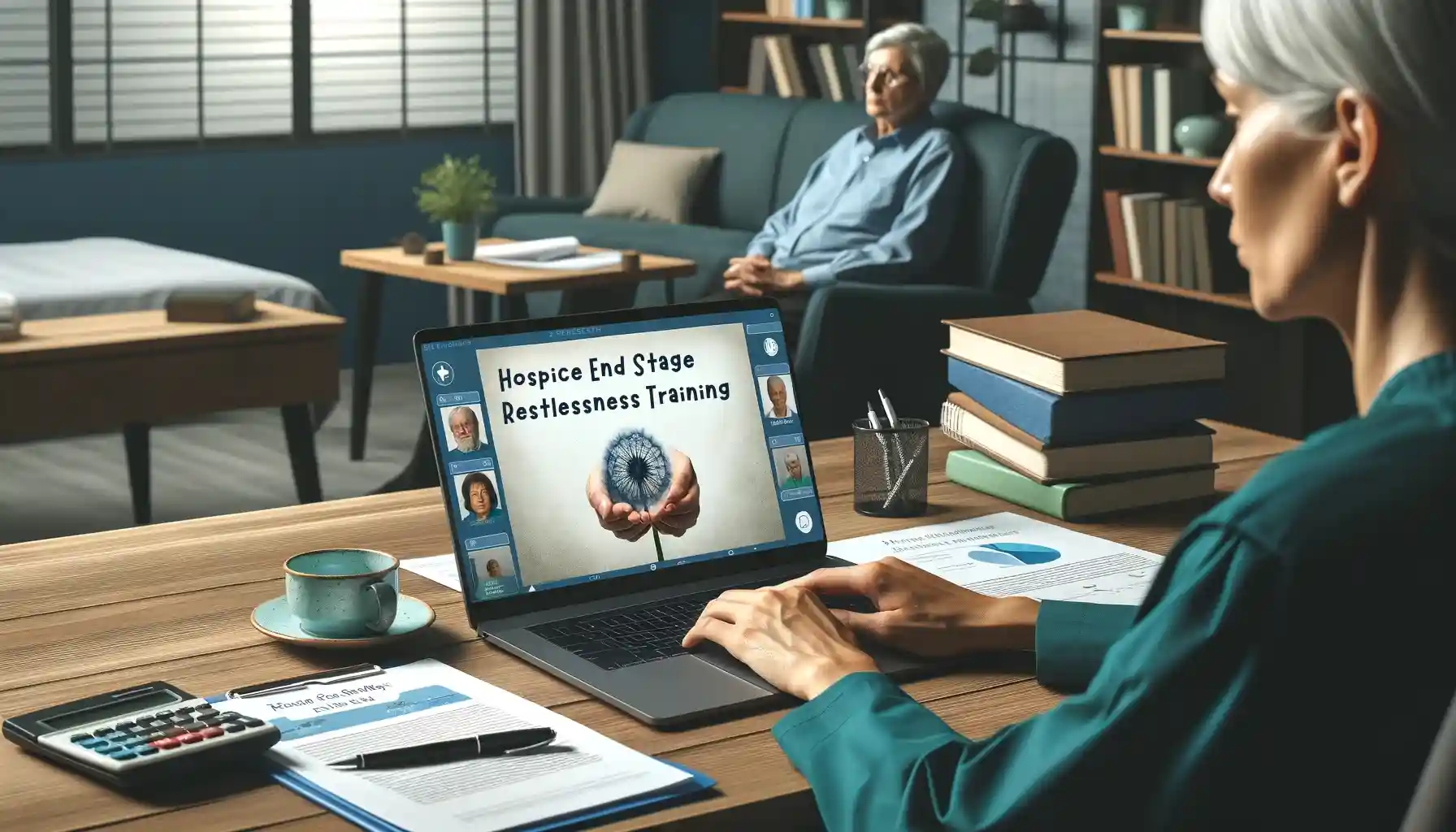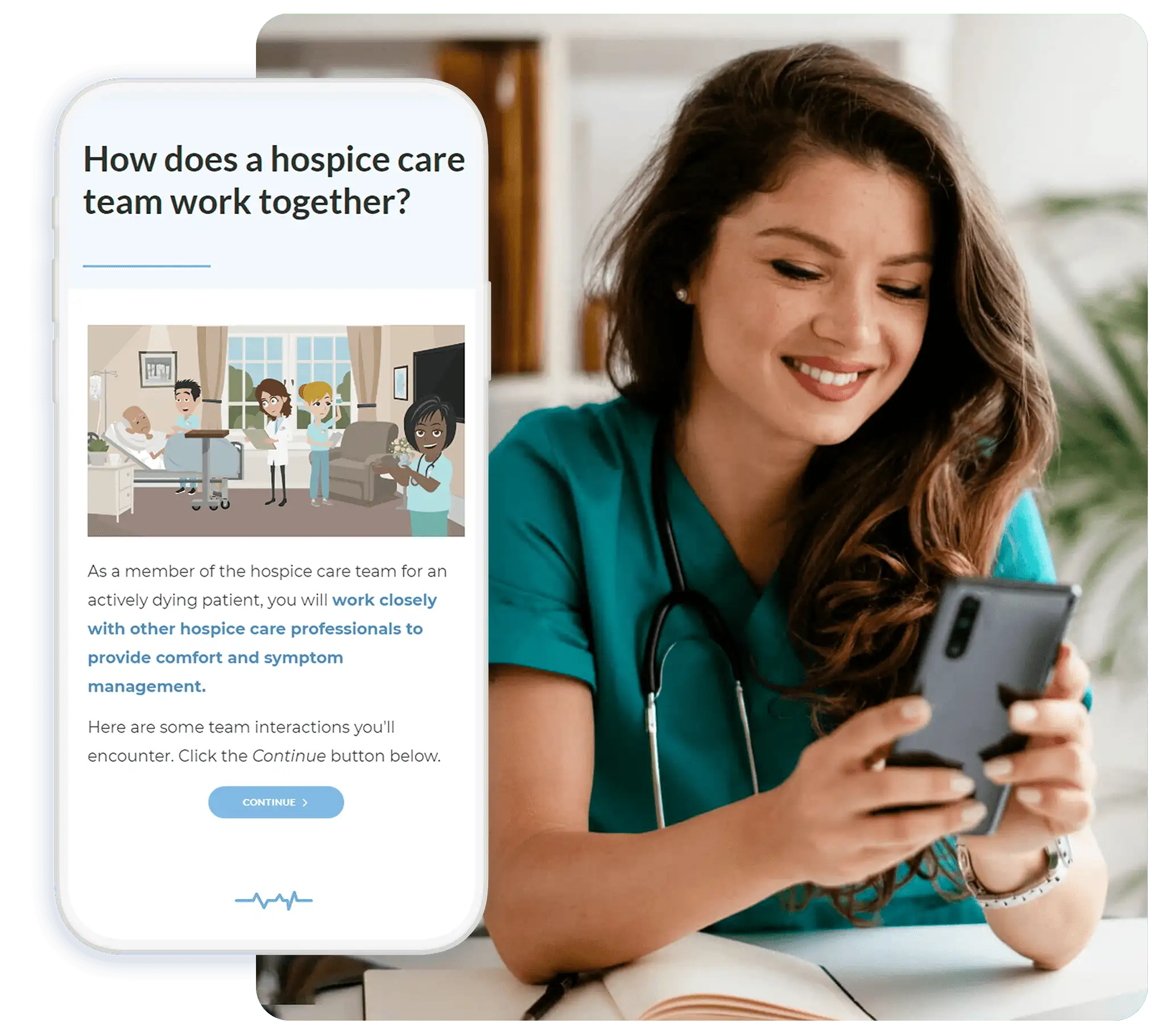Hospice End-Stage Restlessness Training
The training on Hospice End-Stage Restlessness offers a comprehensive study on how to handle terminal restlessness in hospice care. The course delves into understanding and identifying terminal agitation, restlessness, and delirium, and also investigates both drug-related and non-drug-related strategies. The educational material provided grants learners the necessary competency and expertise to deliver empathetic, efficient care to patients and their loved ones during the crucial terminal phase.
Skills You’ll Learn
- Identify End-Stage Restlessness: Recognize the critical signs and symptoms of end-stage restlessness in hospice patients.
- Evaluate Causes: Efficiently evaluate potential causes of terminal patients’ delirium, agitation, and restlessness.
- Pharmacologic Interventions: Master the use of pharmacologic treatments to manage delirium, agitation, and restlessness effectively.
- Non-Pharmacologic Techniques: Utilize non-pharmacologic strategies to comfort and alleviate distress in patients experiencing terminal restlessness.
- Comprehensive Care Approach: Develop a holistic approach that addresses the physical and emotional needs of patients and their families.

Hospice End-Stage Restlessness Training Course Description
Defining the Condition: What Constitutes End-Stage Restlessness?
End-stage restlessness is a complex condition often observed in patients nearing the end of their life. This section provides a clear and concise definition, helping you understand the nuances of this condition. It includes descriptions of common symptoms and how they manifest in terminally ill patients.
Recognizing the Signs: Identifying Signs and Symptoms Early
Timely recognition of end-stage restlessness is crucial. This part of the course focuses on teaching you to identify the early signs and symptoms. You’ll learn to distinguish between regular behavioral changes and those indicative of terminal restlessness, ensuring prompt and appropriate intervention.

CONTINUA LEARNING
Simplify Your Hospice Team’s Training and Skill Building
A complete online solution for your agency: more than 125 hospice courses, caregiver in-services, training plans, and more.
Exploring Causes: Investigating Physical and Psychological Factors
Understanding the causes of delirium, agitation, and restlessness is essential for effective management. This section explores physical and psychological factors contributing to these conditions, providing a comprehensive view that enhances your diagnostic skills.

Pharmacologic Treatments: Effective Drug Strategies
Here, we delve into the pharmacologic treatments for managing terminal restlessness. You’ll learn about various medications, including opioids and anti-seizure drugs, their appropriate use, and how to tailor treatment plans to individual patient needs.
Non-Pharmacologic Strategies: Providing Comfort Beyond Medication
Non-pharmacologic approaches are vital in treating end-stage restlessness. This part of the course teaches techniques such as creating a calm environment, using soothing music, and addressing spiritual and emotional needs, emphasizing the importance of holistic patient care.

How to Get Started with Hospice End-Stage Restlessness Training
Hospice End-Stage Restlessness Training is designed for hospice professionals in hospice and palliative care settings who seek to enhance their expertise in managing end-stage restlessness, agitation, and delirium in terminally ill patients.
Hospice End-Stage Restlessness Training is part of a yearly subscription to Continua Learning. Continua Learning delivers over 300 hospice, home health, and home care training courses and in-services in a mobile solution for easy compliance and tracking it all from one place. Contact us to set up a demo for your agency today! Elevate your expertise. Enhance patient satisfaction.
Hospice End-Stage Restlessness Training Continuing Education
Hospice End-Stage Restlessness Training offers 1.5 CEUs for Nursing, Certified Nursing Assistants, Home Health Aides, and Hospice Aides. Continua Learning is an approved provider of CEUs from the following boards:
- Florida Board of Nursing
- Florida Board Of Occupational Therapy
- Florida Board Of Speech – Language Pathology And Audiology
- Florida Board Of Nursing – Certified Nursing Assistants
Course Reviewer
Kathleen Webster, BSN, RN, CRRN, brings nearly four decades of nursing experience to her role. Earning her BSN in 1984 and CRRN in 2012, she began her career in acute rehabilitation and later specialized in hospice and home health care for over 25 years.
A seasoned educator, Kathleen has authored numerous eLearning courses and led in-service training programs. As a former community care program director, she trained in-home aides and is committed to inspiring quality care and compassion in hospice and home care.
Frequently Asked Questions
What is terminal aging, and how is it managed in hospice care?
Terminal agitation is a form of restlessness that occurs in the final days of life and is characterized by emotional distress and physical discomfort. Our course provides strategies for identifying and managing this condition, focusing on pharmacologic and non-pharmacologic interventions to soothe patients and ensure their comfort.
How Does the Course Address Pain Management in Terminal Illness?
Effective pain management is a critical aspect of caring for patients with terminal illnesses. The course includes detailed insights into pharmacologic options, like opioid use, and holistic approaches to alleviate pain and enhance the quality of life in a patient’s final days.
Can Caregivers and Family Members Benefit from This Training?
Absolutely. While primarily designed for hospice professionals, this course offers valuable knowledge for caregivers and family members, helping them understand the symptoms of terminal restlessness and the care approaches they might encounter or assist with.
What Are the Signs of Metabolic Failure in Dying Patients?
Recognizing signs of metabolic failure, such as increased restlessness and agitation, is crucial in end-of-life care. Our course guides learners through these symptoms and provides appropriate treatment strategies to manage them effectively.
How Long Does Terminal Restlessness Usually Last?
Terminal restlessness varies among patients but usually lasts up to two weeks. The course outlines symptoms’ typical duration and progression, preparing learners to provide consistent and compassionate care during this period.
Is Creating a Calm Environment Part of the Training?
Creating a calm environment is a critical non-pharmacologic strategy covered in the course. Techniques like gentle massage and soothing music are discussed to help learners create a peaceful setting that can significantly alleviate distress in terminal patients.
How is Spiritual Distress Addressed in Patients Experiencing Terminal Restlessness?
Addressing spiritual distress is an integral part of holistic end-of-life care. The course includes strategies for recognizing and responding to spiritual and emotional needs, ensuring a dignified and compassionate approach to patient care.

